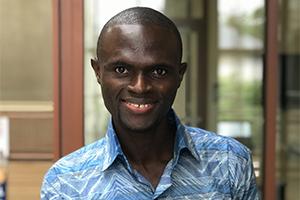Achievements
Emerging Leader: SIS Grad Student Aims to Empower Small Farmers

School of International Service graduate student Ambulah Mamey was recently awarded a Kirchner Food Fellowship, a prestigious honor offered to only three students in North America. The Kirchner fellowship is a one-year program that trains millennials how to be capital allocators in the agriculture sector. It aims to assist farmers with low-cost investment for high-impact results, and it factors in social and environmental concerns. Their mandate this year is about helping small- and mid-size agribusinesses improve soil health and water.
The fellowship is perfectly aligned with Mamey’s interests: He’s earning his master’s degree in development management, with an agricultural development and environment concentration, from SIS at American University. Yet he believes the benefits of the Kirchner fellowship extend well beyond his immediate academic coursework.
“It’s a wonderful opportunity to network with a lot of people, and the two other fellows I’m working with are exceptional,” he says. “And the directors of the program also have a very wide network that we’re benefiting from—in terms of education, experience, and exposure.”
Mamey describes a program that teaches skills in business, management, and diplomacy. “It’s a whole toolkit for developing an emerging business leader, an emerging political leader, an emerging social entrepreneur.”
He is the first American University student to become a Kirchner fellow.
War and Displacement
Mamey was born in Liberia in 1985, about four years before a civil war broke out. The defining circumstance of his childhood, he says, was displacement. As civil war ravaged Mamey’s country, his family frequently relocated to elude violence.
“There might be peace and stability in one region, and you move there for like six months, seven months. And then there might be a rebel incursion, and you’re forced to move to another community,” he says. “But those are challenges that were not unique to me. They’re common among Liberians. But then how do you see those challenges and find opportunities within them?”
His ticket to success was school, but it was sometimes difficult for his parents to afford tuition fees. “You look at their faces, and you ask them for $1,500 to go to school, and they don’t have it,” he remembers. “Meanwhile, they were very committed to doing it. If it will cost them anything, they will do what they have to do to get you back in school.”
Mamey lived in farming communities, and through study and personal observation, he considered ways to strengthen struggling areas through economic development.
“I grew up living and seeing poverty. I know there are solutions to poverty,” he says. “And I saw how agriculture can help significantly in addressing poverty, and that’s what sparked my interest in it.”
Mamey earned his bachelor’s degree from African Methodist Episcopal University in Monrovia, Liberia. He worked in journalism before taking a corporate communications job in the banking sector. He later joined the National Oil Company of Liberia and got active in corporate social relations. During those working years, he participated in projects to support youth and women in agriculture. He also saw a need to empower small farmers.
“It’s not against large farms. It’s encouraging large farms, but also encouraging small, rural farmers to produce for themselves. To produce for their local community, and make them self-sufficient in food production,” he says. “If we could just work with them, empower them, and find them access to finance, you can address poverty significantly.”
Arriving at SIS
He observed that fellow Liberians found job opportunities through study abroad, and he researched graduate programs in the US. He applied to the master’s program at SIS, and he’ll graduate in 2020. Upon arriving here last January, he was immediately struck by the much colder climate. On the positive side, he noticed that AU had more academic resources than schools he attended in Liberia.
“There is access to instructors here who are always willing to contribute, and you can go into their offices. In Liberia, we have challenges with limited teachers. One teacher is teaching at like three or four different schools,” Mamey says. “Here you have diverse students who are very competent and knowledgeable about a lot of different things. So, I’ve been learning a whole lot in class discussions.”
Think Global, Act Local
After graduation, Mamey will likely return to Africa, where he believes poverty reduction is sorely needed.
“In the long term, I want to work at the grassroots level. Build success there, and take it up to the national level,” he says.
The Kirchner Food Fellowship work is not limited to one geographic location, and Mamey says these ideas can be applied globally. And through this fellowship, he’s already seeing how many stakeholders can take advantage of rural development programs.
“Businesses are benefitting, and I’m excited being a part of it. I’m looking forward to completing the fellowship in one year, using those skills for my own purposes and for the purposes of society.”
